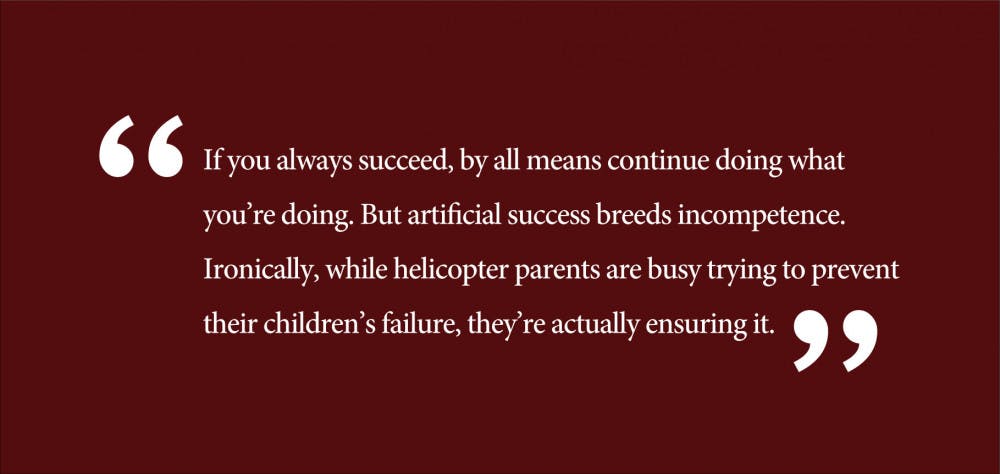Imagine not being allowed to fail. Imagine growing up, seeing failure on the horizon, only to have your parents swoop in and save you. You never learn from your mistakes, because you rarely make any of consequence. Or more precisely, you’re never allowed to make any of consequence.
The recent college admission scandal has thrown this issue into stark relief. 33 parents — celebrities, executives and otherwise wealthy individuals — were indicted on federal charges surrounding attempts to cheat on standardized tests and bribe university officials in order to secure their children’s admittance to top schools. In most instances, their kids didn’t even know it was happening. Parents like actress Lori Loughlin paid $500,000 in bribes to University of Southern California athletic officials to get her two daughters designated as recruited athletes in order to ensure their acceptance. Overall, nearly $6 million in bribes were paid to university officials across the country.
Most people have focused their anger on the parents and the admissions “consultants” who helped them cheat the system. This is understandable. But few seem to be discussing what these fraudsters, and more broadly, an entire generation of parents, have stolen from their children. The helicopter parents of this country have robbed a generation of the opportunity to cope with failure and learn from it.
There’s no strict definition of helicopter parent, and the point at which helpful becomes harmful isn’t always clear. But recent trends show that more parents are falling into the overparenting trap. This includes measures like doing your kid’s homework, calling their college professors and, for the wealthy among us, paying millions of dollars to secure their admission to Yale. These parents go far beyond the bounds of reason to ensure their children’s success. It’s well-intentioned, but misguided, and in some cases can spawn corruption.
It seems hardly necessary to prove that we benefit from failure. But to show what exactly these parents are depriving their kids of, let us enumerate some ways failing helps us grow.
To err is human. Success and failure help us learn which discipline best suits us. Failure makes us more resilient. There will inevitably be times where things don’t go our way. It’s important to learn how to deal with failure early in life. Failing is a natural product of taking risks, and a risk-free life seems hardly worth living.
Sure, the parents caught up in this admissions scandal cheated their kids’ ways into school. And the thought that some kid might have been rejected from their dream school to make room for one of these crooks’ kids is sickening. But these parents are symptomatic of a wider cultural issue: overreaching and overprotective parents have attempted to childproof every aspect of their kid’s lives. The window during which parents are responsible for their children is longer,and the degree of involvement is deeper, than it has ever been.
A large part of this generation is growing up without ever having fallen flat on their faces. It is easy to sit back and snicker at them for having been coddled. I’ve heard many people say, “They’re in for a rude awakening.” But let us not forget that these young people are this country’s future work-force, our future leaders. If they don’t know how to operate in the real world, then we’re all in big trouble.
Perhaps most alarming are the segments of society where this kind of upbringing is most common. Rich kids have always been more privileged than the rest. But, even if this isn’t new, it’s certainly gotten worse. And it should worry everyone that the children of society’s elites, those who are most likely, statistically, to have power and wealth as adults, are also those least likely to have experiences with the real world consequences of failure.
Perpetual invigilation is impossible and anyways undesirable. Failure is the source of improvement. If you always succeed, by all means continue doing what you’re doing. But artificial success breeds incompetence. Ironically, while helicopter parents are busy trying to prevent their children’s failure, they’re actually ensuring it.
Andrew Reed ’21 can be reached andrew_reed@brown.edu. Please send responses to this opinion to letters@browndailyherald.com and op-eds to opinions@browndailyherald.com.





